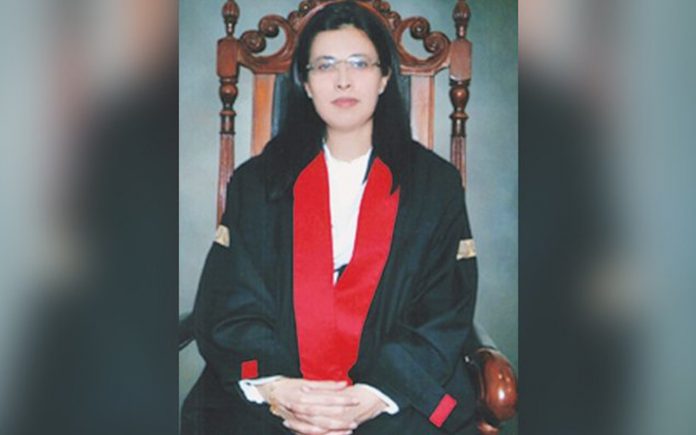Justice Ayesha A. Malik has officially been notified as the first woman Supreme Court (SC) judge after President Arif Alvi approved her appointment, as per a notification issued by the law ministry on Friday.
According to media reports, the notification states that Justice Malik would be able to assume her new position whenever she took oath. The notification mentioned that President Alvi was “pleased to appoint” Malik as a judge of the apex court under article 177 of the constitution.
Two days ago, the Parliamentary Committee on the Appointment of Superior Judiciary had approved Justice Malik’s appointment to the SC.
Earlier this month, the Judicial Commission of Pakistan (JCP) had voted on her appointment after much deliberation, with the outcome being five votes in favor of her elevation with four against it.
Justice Malik’s elevation has been the subject of much discord after SC Chief Justice Gulzar Ahmed nominated her in August last year. The main contention to her appointment was that it would violate the seniority principle, which has been traditionally used to determine the appointment of SC judges.
Her elevation was deliberated upon in September, 2021 as well by the JCP but the commission put aside the idea of her advancement after a tediously long session proved unfruitful. The Supreme Court Bar Association (SCBA) President Abdul Latif Afridi had also raised a call for a nationwide protest in violation of the seniority principle.
The same issue was raised in this month’s JCP meeting as well, and the legal community insisted that the session be postponed. The Pakistan Bar Council (PBC) and all bar associations had warned of a boycott of all court proceedings if the JCP meeting was not put off.
The collection of lawyers, through a resolution, had requested the JCP to stick to the seniority principle till a transparent and fair criteria was formulated to appoint judges at all levels. Opposing lawyers wanted that all stakeholders be taken on board and relevant amendments be made to the Judicial Commission Rules.
In another incident that related to the above, a petition was moved earlier this month in the SC by LHC Bar Association President Maqsood Buttar who asked for directives to bring all concerned bodies and their members to curate a judicial appointments process that was objective and transparent. The petition also requested that detailed rules and guidelines be articulated for the JCP to organize the appointment process.
The petition had further prayed that the JCP abided by the seniority principle, till such time that the request for re-structuration of the process was fulfilled.
Justice Malik, who became an LHC judge in March 2012 and is currently on number four on the LHC judge seniority list, would work as a SC judge until June 2031.
A formidable member of the judiciary, Justice Malik was behind ground-breaking verdicts such as banning the two-finger virginity test in sexual assault cases.







